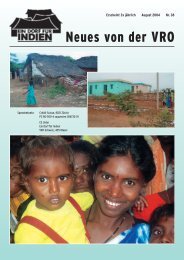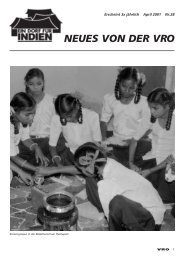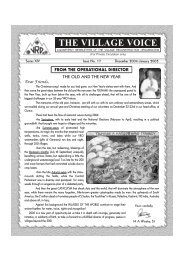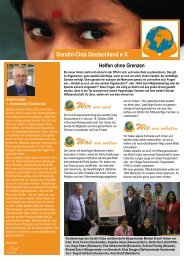+ + Annual Report [2012 â 2013]
+ + Annual Report [2012 â 2013]
+ + Annual Report [2012 â 2013]
You also want an ePaper? Increase the reach of your titles
YUMPU automatically turns print PDFs into web optimized ePapers that Google loves.
+<br />
Cluster Project<br />
The time has come to rethink about the programs and service centers keeping in mind the sustainable <br />
development of villages in the present day context. The continuous support to the villages is making the <br />
villagers dependent on the Organization and the VRO is considered as a resource provider rather than a <br />
facilitator and partner. In the renewed context, the core objectives to be considered are the six pillars <br />
(4Es+Empowerment and Entitlement) of VRO that stand for the development of the rural people who are <br />
neglected and marginalized by various forces both locally and globally. Right now, the rising globalization is <br />
impacting the growth of small-‐scale farmers, producers, local vendors and in particular the villagers to live a <br />
sustainable and peaceful life. At this juncture, the VRO is committed to involve itself to extend its core <br />
objectives towards sustainable and holistic development of the villages by creating a platform where <br />
villagers can stay united and fight for their rights towards sustainable development. The VRO is now making <br />
a shift in its perspective by enabling the people discover their own resources, identify the available <br />
opportunities and improve their skills. Thus VRO wants to be a partner in the development of the rural <br />
people rather than a mere resource provider. <br />
The Cluster approach takes into account the inherent vulnerability of the poor small farmers and the tribal <br />
people. The poor earning capabilities, lack of skills, lack of marketing techniques, un-‐sustainability of the <br />
marginal farmers, the threat of the global food crisis etc. are some of the reasons behind the origin of the <br />
cluster project. The project is based on the belief that unless all tribal people are equipped with the <br />
required skills and until the problems faced by the rural poor and the tribals are optimally resolved <br />
simultaneously, the poor small farmers/producers cannot be relieved from the vicious circle of poverty. <br />
Failing to solve the above problem would result in the collapse of the local food production system and the <br />
livelihood of the poor. The project stresses on the holistic development of the villages through Cluster <br />
approach (circle concept of VRO). <br />
Oct <strong>2012</strong> Nov <strong>2012</strong> Dec <strong>2012</strong> Jan <strong>2013</strong> Feb <strong>2013</strong> Mar <strong>2013</strong><br />
Induction to Training at Training Field Training at Baseline <br />
VRO XIMB continued Introduction Head Office Survey<br />
Induction to VRO <br />
The three cluster teams participated in an induction training and observation session in the month of October <strong>2012</strong>. The <br />
Cluster team, Kothakota had the training from 4 th to 9 th October <strong>2012</strong> and the same training was organized from 10 th to <br />
12 th October in Odisha. During this induction training the team members were taken to a couple of working sites of VRO <br />
and were provided an insight into the work. The new team members were also given an explanation about vision, <br />
mission and values of the organization. The senior volunteers and field coordinators took initiatives to brief the cluster <br />
team members about the history of the organization. Later, they were involved in a community survey so as to imbibe <br />
the idea of the needs of the community. <br />
32


![+ + Annual Report [2012 â 2013]](https://img.yumpu.com/37081838/32/500x640/-annual-report-2012-a-2013.jpg)









